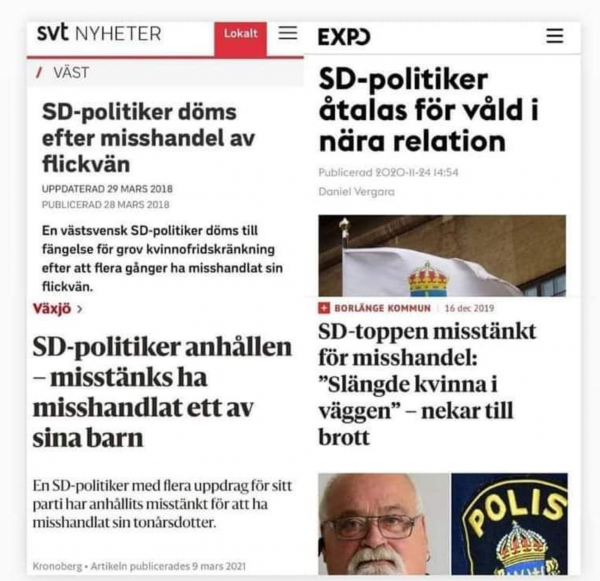KillBill skrev 2024-04-14 15:58:29 följande:
Invandrarkultur kontra feminism
När du kopplar våldet och usel kvinnosyn till invandring trivialiserar du problemet. Svinaktiga män finns överallt..
 //
//
KillBill skrev 2024-04-14 16:19:26 följande:
Nej Jag blandar inte bort korten. Mäns våld mot kvinnor och övergrepp som begås av män mot kvinnor är ett problem i alla samhällen och kulturer. På 60-talet var det lagligt för svenska män att våldta en kvinna inom äktenskapet och först i slutet av 70 talet blev olagligt för svenskar föräldrar att slå sina barn.
Har du fakta som stödjer att inte SD män är överrepresenterade eller gissar du bara? Det är rätt många SD kvinnor som larmat om en sunkig kultur och SDs EU parlamentsledamot Peter Lundgren dömdes för sexuellt ofredande.
omni.se/hanna-wigh-lamnar-sd-efter-larm-om-sexovergrepp/a/9PPBE

Not only do race-based priorities function to obscure the problem of violence suffered by women of color; feminist concerns often suppress minority experiences as well. Strategies for increasing awareness of domestic violence within the white community tend to begin by citing the commonly shared assumption that battering is a minority problem. The strategy then focuses on demolishing this strawman, stressing that spousal abuse also occurs in the white community. Countless firstperson stories begin with a statement like, "I was not supposed to be a battered wife." That battering occurs in families of all races and all classes seems to be an ever-present theme of antiabuse campaigns. First-person anecdotes and studies, for example, consistently assert that battering cuts across racial, ethnic, economic, educational, and religious lines. Such disclaimers seem relevant only in the presence of aninitial, widely held belief that domestic violence occurs primarily in minority or poor families. Indeed some authorities explicitly renounce the "stere-otypical myths" about battered women. A few commentators have even transformed the message that battering is not exclusively a problem of the poor or minority communities into a claim that it equally affects all races and classes. Yet these comments seem less concerned with exploring domestic abuse within "stereotyped" communities than with removing the stereotype as an obstacle to exposing battering within white middle- and upper- class communities
 //
//